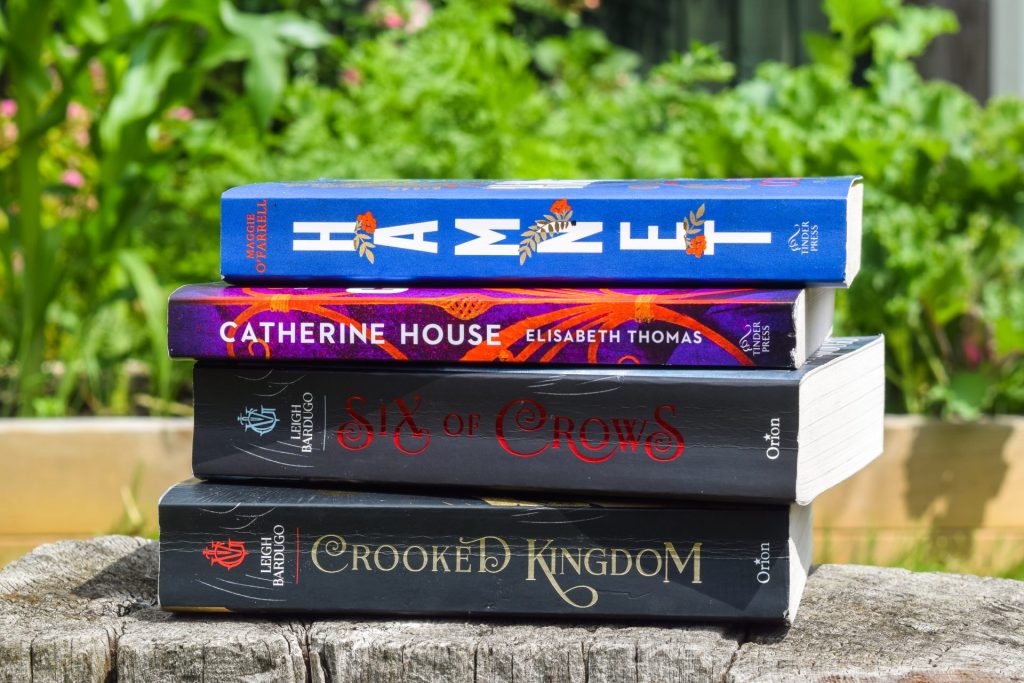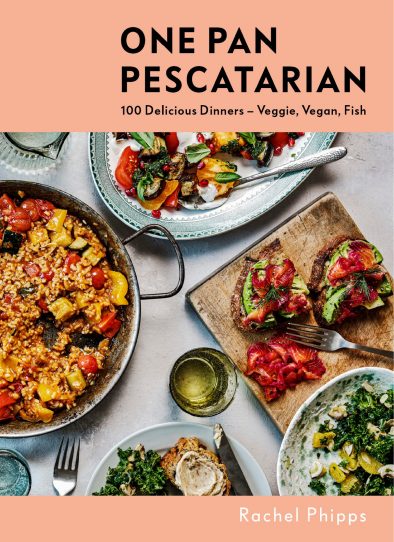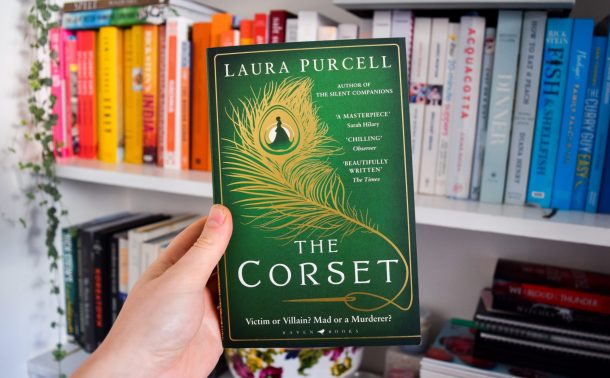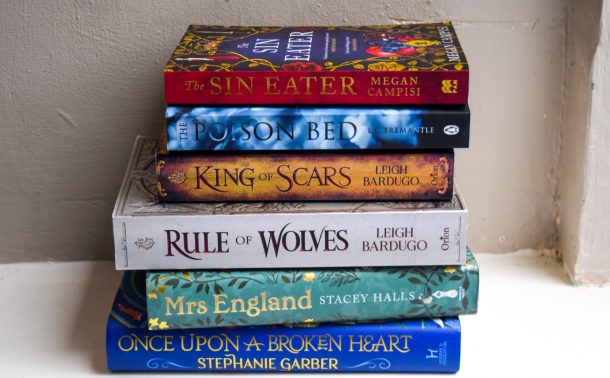Every Brilliant Book I Read This Spring (2021 Edition)

It’s been a funny reading period for me, moving from spring to summer. Sometimes I’ve been too busy to read working on other projects, and I’ve also read some books I’ve really not enjoyed that have put me off starting something new for a few days. However, I’ve also read some absolute gems since I shared all the best books I read last winter, so hopefully you’ll find something below to add to your summer reading lists!
A little bit of housekeeping before we get onto the actual books: usually I mark an affiliate link (so I get a little something back if you buy something, it cost’s you nothing but it helps me keep creating free content here for everyone to enjoy!) with ‘ad’ but there are a fair few in this post so I’ve gone with a ‘*’ instead. I’m also lucky enough to be sent book to review for my bookstagram account Lilac & Ink, and those are marked as gifted.
The Asylum by Karen Coles* (gifted)
This is the best new gothic novel I’ve read in a really long time with a seductive, unreliable narrator at it’s heart with all of the things I love in a gothic novel boxes ticked, from sinister asylums, important graveyards, misty marshes, a big country house full of twisted family secrets, and an earnest doctor trying to uncover the truth.
Maud Lovell has spent the past five years in a lunatic asylum with no memories of how she got there, or of her life before. She’s violent, hysterical, or so the doctors tell her until Doctor Dinmond arrives and includes Maud in his study of medical hypnosis in an attempt to uncover the trauma that landed her there. But, as Maud soon learns, perhaps it is best that she remembers nothing at all.
The Asylum is perfectly paced, slipping between periods of (what we are led to believe is) madness and periods of (again, what we are led to believe as) lucidity and memory. Those, combined with Maud’s dreams build and build to a conclusion that was unimaginable at the start of the book. And then, who can you trust among those (she believes) are trying to help and hinder her in recovering her memories, and her sanity? The Asylum is beautifully written and it deserves to become one of this years most popular gothic novels. If you loved Wakenhyrst*, The Warlow Experiment* or The Shape of Darkness* The Asylum is for you!
The Lady of the Ravens by Joanna Hickson*
My favourite genre is a historical novel told from a womans perspective in a European royal court, so I had high hopes for The Lady of the Ravens that really did not disappoint. It was engaging, well written and compelling in such a way that you just know when you’ve got a good writer on your hands because, let’s be honest, we all know at least the broad strokes of history.
Joan Vaux is a servant to Elizabeth of York, the young woman destined to become Queen to unite the country in the aftermath of the Wars of the Roses. Joan is one of the Queen’s closest companions, later Lady in Waiting and governess to her children. Through Joan’s eyes and the motif of the intelligent Ravens of the Tower of London she befriends and who join her throughout the book a vivid picture is painted of Tudor England and not just of the court, but of the streets of London, the realities and costs of motherhood and war, and of the beautiful, idilic, Kent countryside just a few miles from where I’m sitting typing this now.
When topics have been done so many times I’ve found that what makes a book set in the Tudor court really enjoyable is a unique angle and in Joan and her Ravens Joanna Hickson has given us just that, vivid new eyes through which we can enjoy the familiar story.
Hamnet by Maggie O’Farrell*
I know so many people who have said Hamnet was the best book they read last year: I’ve been very excited for it even before it won all the awards and got all the hype. But I think, actually, waiting might have tarnished slightly my love for this beautiful, lyrical book. I just did not experience the emotional pull I know so many other people have found within its pages. I do think knowing what it is about ruins some of the magic, so if you already have heard of the book and are thinking about reading it, perhaps go buy a copy (it is excellent!) and skip forward to my next review?
Hamnet is rushing around Stratford Upon Avon looking for someone, anyone to help. His twin sister has fallen ill but his mother, his older sister, his aunt, his grandparents, they’re no where to be found. Little do any of them know that by the end of the week, Hamnet will be dead. This is a book about death, families and relationships. Hamnet is William Shakespeare’s only son, whose death came a few years before he wrote Hamlet, and this is a fictional take on his marriage, the lives of the family he left behind to work in London and how his absence impacted them. This book jumps times and perspectives like nobodies business but the writing is so detailed, so immersive it honestly does not feel jarring in the slightest, it simply just draws you in deeper. Another touch I liked – that many people have commented in and I think I would have been more impacted by if I’d not known about it – was the fact Shakespeare is never mentioned by name, he’s just referred to as ‘Agnes’ husband’, ‘Hamnet’s father’, etc. I think this details power was lost in the loss of the slow realisation of who we are talking about.
In no way do I think this book is overrated. If anything, to draw a comparison to the days when writing reviews of London’s restaurant scene was my day to day, it is like the meat fruit at Heston Blumenthal’s Dinner: still an incredible, delicious piece of mastery, but without the added surprise: so many people wrote about it, snapped it, instagrammed it, no longer was anyone presented it fooled that what was in front of them was the piece of fruit the illusion wanted you to believe in. It is possible that Hamnet’s true power and brilliance may be a victim of its own success.
Hamnet is a brilliant book and well worth a read, though, perhaps, you might have enjoyed it more if you’d never read this review?
Catherine House by Elisabeth Thomas*
Catherine House is a university like no other. Once your enter for three years you will have no more contact with the outside world. Catherine graduates are clever, bright, brilliant and successful. Catherine students are hand picked for their brilliant, special qualities. Ines was picked, picked before she even had something to run from. Finding refuge at Catherine, she does not even – at least at first – think to question how too good to be true the school really is.
There is no question that this book very much plays into the trope of a big, rambling, crumbling gothic house with sinister secrets, but while there are some aspects of the house that are very much like a prison: they must earn points to gain privileges from the commissary, there is a punishment that is a form of solitary confinement – the way Thomas has written the house it also takes on a life (very Daphne du Maurier) of its own in a way I think you sometimes can’t help but feel affection for, even if you don’t understand the science (it’s made up, you’re not supposed to) but still understand that there is something very, very wrong, gathering the breadcrumbs as Ines starts to scratch just beneath Catherine’s surface.
Lots of reviews of Catherine House complain that the plot does not go anywhere, that the ending is unsatisfying, but I don’t agree. The writing is beautiful and immersive. It makes you think, makes you feel. I don’t think we know what to feel about the ending because Ines doesn’t, either. Not really.
If you like dark, sinister reads, modern gothic or modern literary fiction, give Catherine House a go – also if you enjoyed either of Christina Dalcher’s two most recent books, Vox* and Q*, or if you, like me, got a little obsessed with Phoebe Wynne’s Madam* – which is the best gothic novel I’ve read in years – I think you’ll really love this marmite read.
The Rokesbys & The Smythe-Smith Quartet by Julia Quinn
As you may have noticed by now, while I’m not really a reader of romance novels I simply adore romance novels written by Julia Quinn, especially on audiobook and this spring I worked my way through all four Rokesby books and all four Smythe-Smith books, all of which are really worth reading if you love clever books full of romance and vivid, laugh out loud characters – even if you’re not usually a reader of romance novels because Julia Quinn’s writing is just brilliant, nowhere near as irritating and cliched as other romance writers can be. I’d recommend either quartet, but honestly, while the first Rokesby book, Because of Miss Bridgerton* is not my favourite of the bunch, I’d recommend you start there as the next two, The Girl with the Make-Believe Husband* and The Other Miss Bridgerton* are among my favourites of her books, so, so good, twisty, funny, heart-wrenchingly wonderful.
Six of Crows & Crooked Kingdom by Leigh Bardugo*
If I’m to be totally honest I only read this second duology in Leigh Bardugo’s Grishaverse both so I’d not have some of it spoiled when I went to watch Shadow and Bone on Netflix, and so that I could get to King of Scars*, the second duology I was far more excited by where we return to some of the characters from the Shadow and Bone* trilogy. A heist novel is not usually my sort of thing and while I did not devour these like I did Shadow and Bone, I’m still really glad I read them for their rich, clever storylines, big reveals and bold characters. Heist novels I still don’t really think are my thing, but I think this pair would make fantastic summer reads.
The job is simple. Six misfits from the Dregs, one of Ketterdam’s top criminal gangs have been tasked with breaking into the supposedly impenetrable Ice Court and free a scientist whose work may have devastating consequences on the stability and security of the world as they do it. The stakes are high, but not as high as the life changing payout they’ve been offered should the succeed at what might be best described as a suicide mission.
The Jasmine Throne by Tasha Suri* (gifted)
I loved Tasha’s first book, Empire of Sand* when I read it a few years ago (and the stand alone sequel, Realm of Ash* is still on my wish list) and while The Jasmine Throne I think will kick off a series that is much richer and more complex, and while the writing was still brilliant, for me it did not have that same addictive quality that Realm of Ash did which had me staying up to read late into the night. The Bone Shard Daughter* springs to mind as a book I absolutely ADORED last year, that, which, if you also enjoyed I really think The Jasmine Throne is worth you seeking out a copy of too.
Malini may be an Imperial Princess, but she’s been imprisoned in the Hirana, an ancient, magical temple with a mind of its own and the site of a horrific act by her dictator brother. Priya is a maidservant with a past that makes her something more, but that she’s desperate to keep a secret, happy to hide within a life of drudgery. But when Malini accidentally bears witness to the truth of her, the two women are thrown together in a way that might just change both their destinies, as well as that of the entire empire.
I enjoyed the rich world building and the beautiful writing, but I think what made this book slightly less than perfect for me was I found it difficult to connect with any of the characters (or their romance) – I know they were not supposed to be sympathetic, but I think it is the characters more than anything else that really draws me into a book – I also felt that the same story could happen in less pages and it could have been snappier. However, one device I really loved in the book which was a benefit of the sheer number of pages was how in some chapters we got behind the eyes of random people we only ever met once as a way of showing us what was happening elsewhere from the perspectives of the people Priya and Malini’s actions will impact. It made the storytelling special in a way of not seen before.
For more book reviews, do follow me over on my bookstagram, Lilac & Ink!






Discussion